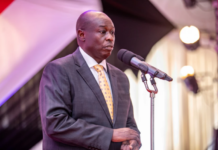Aviation workers in Kenya have vowed to escalate their protests against a controversial agreement with India’s Adani Group for the upgrade and management of Jomo Kenyatta International Airport (JKIA), the country’s primary international gateway.
The workers’ discontent raises significant concerns about the deal’s implications for bilateral relations between Kenya and India, especially as discussions unfold back home regarding the potential damage to India’s image in Africa.
On Tuesday (3rd September), the Congress party objected to the Adani Group’s proposal to upgrade an airport in Kenya as the Indian conglomerate could pip Chinese firms who have also been eyeing the same project.
While expressing concerns about the developments in Kenya, Congress leader Jairam Ramesh claimed that the ongoing protest against the Adani Group could “easily convert into anger against India and the Indian Government”.
Indian political leaders have taken notice of the growing protests, with Jairam Ramesh, a spokesperson for the Indian National Congress party, expressing concern on social media.
He warned that the unrest in Kenya could lead to increased animosity against the Indian government, describing the situation as a “grave concern for India.”
Ramesh criticized the Indian leadership for its close ties with the Adani Group, which has been embroiled in contentious agreements abroad, suggesting that the government’s foreign policy credibility is at stake.
The agreement, which involves a US$2.5 billion lease of JKIA for a 30-year period, was approved by the Kenya Airports Authority (KAA) without a public tender or hearings, a fact that has fueled public outrage and suspicion regarding transparency and accountability.
Despite massive opposition, Adani Enterprises has moved to establish a Kenyan subsidiary, Airports Infrastructure PLC (AIP), as part of its expansion strategy.
This development was officially documented in a filing submitted to the National Stock Exchange of India, indicating that AIP will oversee various airport operations including maintenance and modernization.
The recent announcement of a “due diligence” visit by a Kenyan delegation to India, which involves meetings regarding Adani Holdings’ financial records, has further angered union leaders.
Moss Ndiema, the secretary-general of the union, questioned the necessity of expedited negotiations, stating,
“The Kenyan delegation going to India does not create the right environment for dialogue.”
He criticized the government’s haste as inappropriate given the circumstances.
A bid to quell dissent was made as Labor Cabinet Secretary Alfred Mutua met with union representatives on Wednesday, attempting to dissuade them from going on strike.
However, the union remains resolute, declaring that the only acceptable resolution is the complete cessation of the Adani deal.
The looming strike could have broader implications for both Kenyan workers and foreign partnerships in the region.



















